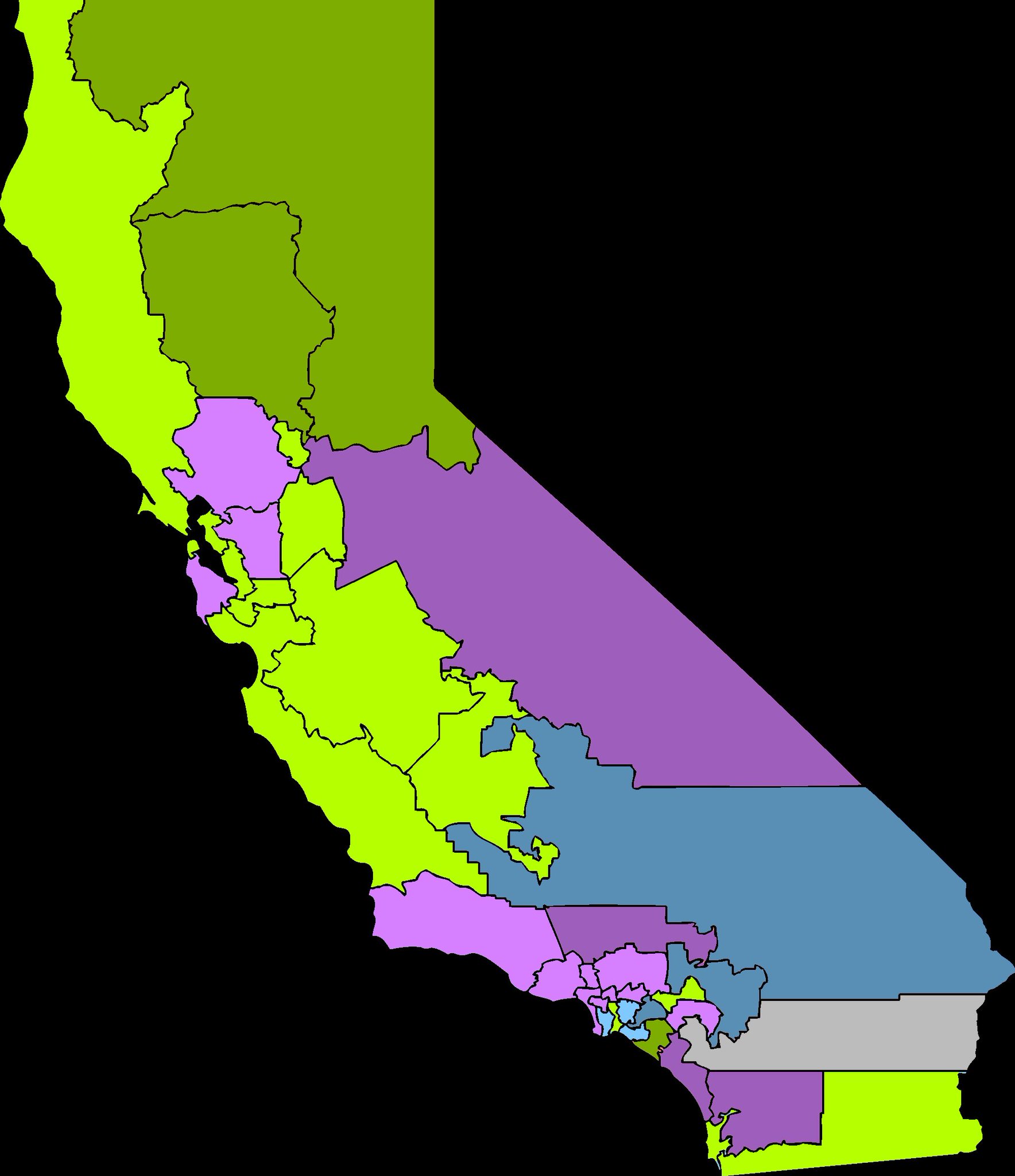The California State Senate this morning (for a second time after an initial vote last night) narrowly and finally killed SB 50, a major climate-land use bill that would have allowed apartment buildings near major transit stops and job centers. Despite high-profile opposition from some low-income tenants groups, the senators voting against the bill largely represent affluent suburbs.
To illustrate the geographical divide, a Twitter user put together this map of the senate districts and votes, with purple opposed, green in support (light for Democrat and dark for Republican), and blue abstaining:

As you can see, the “opposed” senators largely cluster along on the affluent coastal and suburban areas. This dynamic is particularly apparent in the San Francisco Bay Area, where representatives of the urban core supported the bill (including bill author Sen. Scott Wiener and Sen. Nancy Skinner). But the senators representing the suburban, high-income Silicon Valley communities (Sen. Jerry Hill), affluent East Bay suburbs (Sen. Steve Glazer), and the Napa area (Sen. Bill Dodd) were all opposed.
Meanwhile, Southern California Democrats representing high-income coastal suburbs were almost uniformly opposed:
- Sen. Hannah-Beth Jackson, representing Santa Barbara communities;
- Sen. Henry Stern, representing Malibu and suburbs north of urban Los Angeles;
- Sen. Ben Allen, representing the Westside of Los Angeles, including Manhattan Beach and Beverly Hills;
- Sen. Anthony Portantino, representing La Cañada Flintridge and who had unilaterally shelved the bill last year in his committee; and
- Sen. Bob Hertzberg, representing the San Fernando Valley.
Notably, there were some standout “profiles in courage” votes in favor of the bill, including:
- Sen. Lena Gonzalez from Long Beach, despite opposition from city leaders in her district;
- Sen. Brian Dahle from the conservative, northern inland part of the state, who recognized the damage sprawl does to farmland;
- Sen. Bill Monning of Carmel who spoke passionately about the inequality and devastating commutes wrought by exclusive local land use policies; and
- Sen. John Moorlach of coastal Orange County, a Republican (and bill co-author) who appreciated the legislation giving more property rights to landowners.
What were the argument of opponents? They largely involved these issues:
“The bill will not produce enough affordable housing.” The bill in fact contained minimum requirements that projects receiving benefits under the bill include affordable units. As a result, SB 50-type reform would result in the biggest boost to subsidized affordable units in the state’s history, at possibly a seven-fold increase.
“SB 50 takes away local control.” To the contrary, the bill would give low-income communities five years to develop local plans for infill housing and two years for other communities to plan to meet these standards. Locals would be free to set more aggressive standards on affordability and relax restrictions even more if they wanted to do so. SB 50 also did not alter local permit approval processes. Furthermore, for senators who profess to care about the housing shortage, local control is the single biggest cause of the shortage, particularly through restrictive zoning.
“The bill will lead to gentrification and displacement.” This is a real, yet overstated, concern that the bill addressed with numerous provisions to protect against new developments displacing low-income tenants (a massive, ongoing problem that predates SB 50 and is made worse by the exclusionary housing policies SB 50 was designed to prevent). Furthermore, local governments were free to go beyond those protections. Second, as UC Berkeley’s Terner Center for Housing Innovation documented, any projects under the bill only “pencil” in high-income areas where developers get higher returns. Finally, as the Urban Displacement Project at UC Berkeley (in collaboration with researchers at UCLA and Portland State) found, new market-rate and affordable housing at a regional scale reduces gentrification and displacement overall.
Finally, Sen. Henry Stern uniquely argued against the bill for encouraging development in high-fire zones. It was an odd argument, considering that the SB 50 zones around transit are in some of the only non-fire, urban zones in the state, while the bill contained explicit language preventing application in high-severity zones. Furthermore, encouraging growth in infill areas reduces pressure to sprawl into the same wildlands Sen. Stern is worried about. Yet Sen. Stern was convinced that the protections weren’t strong enough and conceivably was worried that the provision in the bill allowing conversion of single-family homes into fourplexes would put more people into harms way. Given this logic, will Sen. Stern now support a bill banning new construction in high-fire zones? Or would he have supported the bill with an amendment banning such construction? He did not respond to these questions on his Facebook page.
So what’s next? The bill or some form of it could be brought back this legislative session as a “gut-and-amend” of an existing bill. Indeed, Senate pro tem Toni Atkins vowed shortly after the vote to bring a housing production bill back before the legislature this session. Supporters could also try a more limited approach, such as exempting controversial parts of the state from the bill.
Otherwise, given the long-term problem and entrenched opposition to change, the fact that such a landmark bill only fell three votes short is quite an accomplishment. Since the problem will only get worse, the political pressure to act will increase. That means that something like SB 50 will ultimately pass in California. It will be too late for those priced out in the near term, and possibly too late to address our 2030 climate goals, which will require reduced driving miles from housing closer to jobs and transit absent major technological innovation. But it will happen, because reforming our land use governance is the only way to solve this problem.
3 thoughts on “BREAKING: SB 50 Voted Down By State Senators Representing Affluent Suburbs”
-
Pingback: Environmentalists Can Help Address Racism Through Housing Policy | Ethan Elkind
-
Pingback: Housing Solutions Fizzle In California’s Legislature | Ethan Elkind
-
Pingback: Housing Solutions Fizzle In California's Legislature | ColoradoBoulevard.net
Comments are closed.


